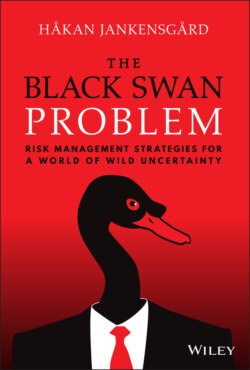Читать книгу The Black Swan Problem - Håkan Jankensgård - Страница 17
NOTES
Оглавление1 1 The Black Swan criterion where the 9/11 attack might falter is the ex‐post explanation part. Black Swans are supposed to make total sense after the fact, once our brain gets to work connecting the dots, which ends up giving it an air of inevitability. At least I struggle to connect some of those dots. Of course, we now know there are Islamic warriors engaged in a cosmic war that ends either in their destruction or in that of their enemies. However, that they would choose that means of meting out their punishment, and that it could be pulled off, remains unfathomable to this day.
2 2 Bernstein, P. L., 1996. Against the Gods: The remarkable story of risk. John Wiley & Sons: New York.
3 3 Frank Knight (1921) first made this distinction and referred to known odds as ‘risk’. This epithet is unfortunate and will not be adhered to in order to avoid unnecessary confusion. In the present book, risk is construed of as the value of a random variable on which our well‐being depends (such as corporate performance) falling below some aspirational or critical level (such as the level needed for debt servicing). Risk is thus a function of uncertainty, but has nothing to do with whether odds are known a priori or not. Knight, F. H., 1921. Risk, uncertainty, and profit. Hart, Schaffner & Marx: New York, NY.
4 4 I leave out a consideration of particles at the subatomic level, which, according to important theories in physics, are governed by pure randomness. This randomness, say the same theories, can be described in precise, mathematical terms (i.e. the odds can be known).
5 5 In Taleb's terminology, wild uncertainty is found in a place called Extremistan, whereas benign uncertainty harbours in Mediocristan (Taleb, 2007, p. 35).
6 6 www.griddy.com, accessed 10 July 2021.
7 7 Some retail customers had opted out of the standard fixed‐rate utility plans and instead bought their electricity from businesses that passed wholesale prices on to them directly. Some of these customers racked up electricity bills in the range of $8,000–10,000 in a matter of days (Winter storm fallout sends Texas power firm Griddy into Bankruptcy. Financial Times, 15 March 2021).
8 8 Taleb, N. N., 2012. Antifragile: Things that gain from disorder. Random House: New York.
9 9 Episode #1564 of the Joe Rogan Experience. Alter is referring to the claim made by some, mostly the young, that they would rather have a finger broken than their phone smashed.
10 10 For this quote, and other useful perspectives, read the article “Everything You Think You Know About the Collapse of the Soviet Union Is Wrong” on foreignpolicy.com. Everything you think you know about the collapse of the Soviet Union is wrong, Foreign Policy.
11 11 The next outbreak? We're not ready, Bill Gates – YouTube.
12 12 Camus, A., 1947. The Plague. Librairie Gallimard.
13 13 I should be careful here. The Earth is under threat from rocks in space. While earthlings' primary tactic, if detected in time, is likely to be to try to nudge such an object on to another course using force. Perhaps, however, the response will also involve some attempt at sending people up there to deal with the problem on site. Let us leave all options on the table.
14 14 This bias co‐exists with a negativity bias that has us putting undue focus on negative aspects and overreacting to them. For example, if you receive 100 great reviews for something you did, but only one negative, you are quite likely to spend the rest of the week ruminating over that negative review.
15 15 Kahneman, D., 2011. Thinking fast and slow. Farrar, Straus and Giroux: New York.
16 16 Meyer, R. and H. Kunreuther, 2017. The Ostricht Paradox: Why we underprepare for disaster. Wharton School Press.
17 17 Plous, S., 1993. The psychology of judgment and decision making. McGraw‐Hill: New York.
18 18 Garrett, B., 2020. Bunker: Building for the End Times. Scribner: New York.
